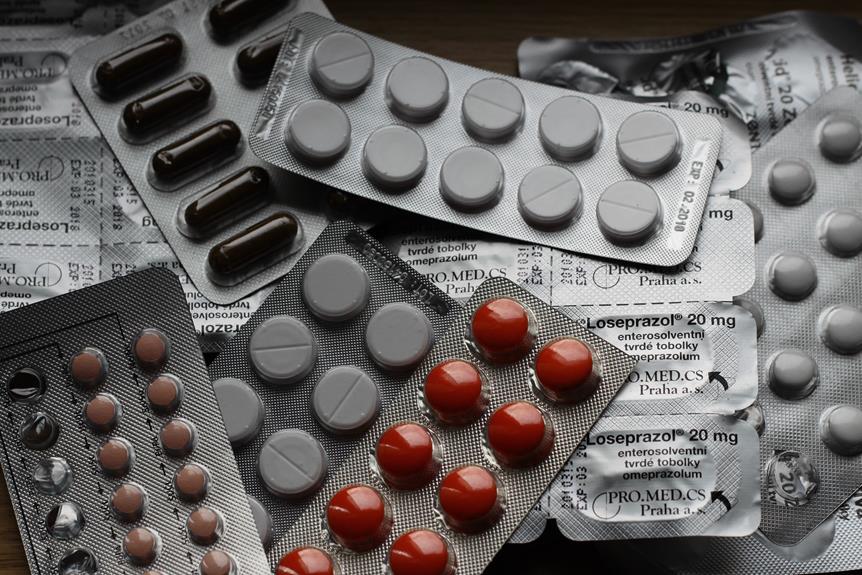Pharmaceutical Giants Face Lawsuits Over Dangerous Drugs
This article delves into the ongoing legal battles faced by Pfizer and Eli Lilly over their drugs, Lyrica and Cymbalta. Allegations of misleading marketing, off-label use, and severe side effects raise important issues about the pharmaceutical industry's ethical responsibilities. The analysis explores the implications of these lawsuits and underscores the necessity of transparency in drug marketing and prescription practices.

Key Takeaways
- Eli Lilly and Company and Pfizer, the makers of Lyrica and Cymbalta, are facing massive class-action lawsuits for failing to inform patients about withdrawal symptoms and misleading marketing materials.
- Patients have reported severe side effects including suicidal thoughts, major depressive disorder, memory loss, difficulty remembering and concentrating, vomiting, seizures, loss of bladder control, and rapid weight gain or loss.
- Lyrica and Cymbalta are commonly used off-label to treat pain and neuropathy, but their long-term effects and the full extent of potential side effects are still uncertain.
- Hiring a lawyer who specializes in bad drug lawsuits is necessary to navigate the legal process and seek compensation for those affected by the dangers of Cymbalta and Lyrica.
The Legal Landscape: Major Lawsuits Against Pharmaceutical Companies
The ongoing legal landscape is punctuated by major lawsuits against pharmaceutical companies like Eli Lilly and Pfizer, focusing predominantly on allegations of misleading marketing and failure to disclose severe withdrawal symptoms associated with their drugs, Lyrica and Cymbalta. This situation underscores the importance of pharmaceutical company accountability and the legal implications of dangerous drugs. Lawsuits highlight the continuous obligation of pharmaceutical companies to provide accurate and transparent information about their products. As these cases unfold, the question of appropriate remedial measures and penalties arises. The significant financial and reputational impact on these companies serves as a stark reminder for the industry at large. This issue not only raises concerns about patient safety but also underscores the critical role of regulatory bodies in enforcing accountability and transparency within the pharmaceutical industry.
Marketing Controversies: Misrepresentation and Off-label Use
Amidst the debate on marketing controversies, the ethical integrity of pharmaceutical firms is being questioned due to allegations of misrepresentation in advertising materials and the off-label use of drugs like Lyrica and Cymbalta, raising serious concerns about patient safety and corporate responsibility. Pharmaceutical marketing tactics, often focused on maximizing profits, have led to the misuse of these drugs, with serious implications for public health. Patient advocacy and support groups are increasingly calling for greater transparency and stricter regulation in the pharmaceutical industry. The off-label use of such drugs, promoted by misleading marketing, has resulted in unforeseen side effects, from severe withdrawal symptoms to suicidal thoughts. This has underscored the urgent need for stronger oversight and more ethical marketing practices within the pharmaceutical sector.
Unforeseen Side Effects: Patient Risks and Experiences
Navigating through the unforeseen side effects of drugs like Lyrica and Cymbalta, patients are experiencing severe withdrawal symptoms and suicidal thoughts, thereby prompting a growing concern about patient safety and the need for more stringent pharmaceutical regulations. Patient testimonials reveal the harrowing reality of these side effects, highlighting the urgent need for transparency from pharmaceutical giants. Numerous legal compensation options are available to victims, including class-action lawsuits against Eli Lilly and Pfizer. These lawsuits allege misleading marketing and failure to disclose withdrawal symptoms, underscoring the importance of regulatory oversight. As the discourse around these drugs evolves, it is crucial for all stakeholders to prioritize patient safety and ensure that the medical community is adequately informed about potential risks.
The Dark Side of Off-label Use: Suicidal Ideations
In this discourse, we delve into the dark side of off-label use, particularly the alarming link between such usage and suicidal ideations, a grave concern that underscores the urgent need for pharmaceutical companies to ensure thorough tests and transparent communication of potential risks. Numerous reports document a disturbing link between off-label use of drugs like Lyrica and Cymbalta and major depressive disorder. The increase in suicidal thoughts among users is a critical issue, one that is unfortunately complex to trace back to off-label prescriptions. The challenge arises due to the myriad factors influencing mental health. However, this complexity should not deter pharmaceutical firms from conducting exhaustive investigations into these dangerous correlations and taking measures to mitigate potential harm.
The Lingering Aftermath: Long-term Effects of Lyrica and Cymbalta
Many patients experience persistent side effects from Lyrica and Cymbalta, and these debilitating consequences, including memory loss and cognitive impairment, underscore the urgent need for comprehensive studies on the long-term impacts of these medications. The impact on memory may be a result of the medications interfering with synapses, the brain's communication channels, thus hindering the creation of new memories. Whilst these drugs provide short-term relief for conditions like neuropathy and chronic pain, their long-term impact raises considerable concern. The lingering memory loss and cognitive impairment reported by numerous patients is a glaring testament to the necessity of in-depth research in this area. The medical community and pharmaceutical giants must acknowledge and address these issues to ensure the safety and well-being of patients relying on such medications.
Understanding the Role of Pharmaceutical Sales Representatives
Pharmaceutical sales representatives, who serve as a critical bridge between drug manufacturers and healthcare providers, play a key role in promoting medications like Lyrica and Cymbalta, but they are often under scrutiny for their aggressive marketing strategies and potential role in the over-prescription of these drugs. The influence of marketing tactics employed by these representatives can significantly sway prescribing patterns, potentially leading to off-label use and increased patient risk. This role, while critical to the pharmaceutical industry, raises ethical questions about the balance between business interests and patient health. The role of pharmaceutical sales representatives has therefore become a subject of controversy and legal scrutiny, with calls for increased transparency and accountability in their practices.
How to Navigate a Bad Drug Lawsuit: Tips and Strategies
Navigating a bad drug lawsuit requires not only a deep understanding of the legal landscape, but also strategic planning and patience. It begins with the filing process, an intricate procedure that demands careful documentation of evidence, correctly filled forms, and strict adherence to timelines. This is where legal expertise becomes invaluable, ensuring that no critical steps are missed or mishandled. Compensation options should also be thoroughly explored, as they can range from reimbursement for medical expenses to damages for pain and suffering. However, it's important to remember that each case is unique, and outcomes can vary widely. The path to justice in a bad drug lawsuit may be complex and challenging, but with diligent preparation and the right legal support, it can be successfully navigated.
Unraveling the Duration and Complexity of Pharmaceutical Lawsuits
Often, the length and intricacy of pharmaceutical lawsuits are influenced by numerous factors, such as the complexity of the case, the court's availability, and the negotiation processes, and thus, require careful management and considerable patience. Accurately gauging the duration of these lawsuits is a challenging task due to these factors. Complex pharmaceutical lawsuits often involve intricate scientific evidence, necessitating expert testimony, which can extend timelines. Moreover, court availability can fluctuate wildly, further complicating the calculation of lawsuit duration. The negotiation process, involving detailed deliberations between parties, can also prolong these cases. Navigating these complexities requires significant legal expertise, underscoring the importance of experienced legal representation in pharmaceutical lawsuits. The challenges of navigating these lawsuits are manifold, but understanding the influencing factors can provide insight into the process.
Frequently Asked Questions
What Other Pharmaceutical Giants Have Faced Similar Lawsuits Regarding Dangerous Drugs?
Several pharmaceutical companies have faced lawsuits for dangerous drugs, underscoring the impact of drug recalls on patient safety and the need for pharmaceutical accountability measures. Johnson & Johnson, for instance, faced legal action over opioids and talc-based products. Similarly, Merck was sued over its drug Vioxx. Bayer also encountered lawsuits related to its contraceptive device, Essure. These instances highlight the critical importance of rigorous testing, transparent marketing, and effective recall procedures within the pharmaceutical industry.
How Do Pharmaceutical Companies Respond to Allegations of Misrepresentation and Off-Label Use?
Pharmaceutical firms typically respond to allegations of misrepresentation and off-label use through rigorous legal defense strategies. They often reaffirm their commitment to patient safety and adherence to regulatory guidelines. However, such allegations can lead to legal consequences, severely impacting their reputation and consumer trust. They may also initiate internal investigations or take corrective measures to address these issues. Nonetheless, the ultimate resolution often depends on the legal proceedings and the severity of the allegations.
Are There Programs or Resources Available to Help Patients Deal With the Long-Term Side Effects of Drugs Like Lyrica and Cymbalta?
Several resources are available to help patients manage long-term side effects of drugs like Lyrica and Cymbalta. Patient Advocacy groups offer support and information, while healthcare providers can suggest alternative therapies such as physical therapy or cognitive behavioral therapy. Additionally, online communities provide a platform for shared experiences and advice. It's crucial for patients to discuss these side effects with their healthcare provider to ensure a comprehensive management plan.
What Kind of Training and Regulations Are in Place for Pharmaceutical Sales Representatives to Ensure Ethical Practices?
Pharmaceutical sales representatives undergo rigorous training on product knowledge, regulatory compliance, and ethical practices. The industry is regulated by bodies like the FDA, which enforce guidelines to ensure ethical marketing strategies. Accountability is essential, with breaches potentially leading to severe consequences for both the representative and their company. However, there's an ongoing debate on whether these measures are sufficient in preventing misleading promotion of drugs.
Has There Been Any Effort by the Government or Regulatory Bodies to Curb the Duration and Complexity of Pharmaceutical Lawsuits?
Efforts by government and regulatory bodies to address the duration and complexity of pharmaceutical lawsuits have been observed. Such initiatives, often termed 'Regulatory Reforms', aim to streamline litigation processes and make them more efficient. Government intervention plays a critical role in these reforms, which can include setting timelines for case proceedings, simplifying legal procedures, or introducing technology to enhance case management. However, the effectiveness of these measures remains a topic of ongoing analysis and research.
Conclusion
The lawsuits against Pfizer and Eli Lilly highlight the dire need for ethical marketing practices and transparency in the pharmaceutical industry. As the legal battles unfold, they underscore the potential risks of off-label drug use and the pressing need for comprehensive patient information. These cases also emphasize the importance of proper oversight and regulatory compliance, urging for a more patient-centric approach in drug prescription and marketing practices.

This post has been generated by AI and was not reviewed by editors. This is Not legal advice. Please consult with an attorney.




